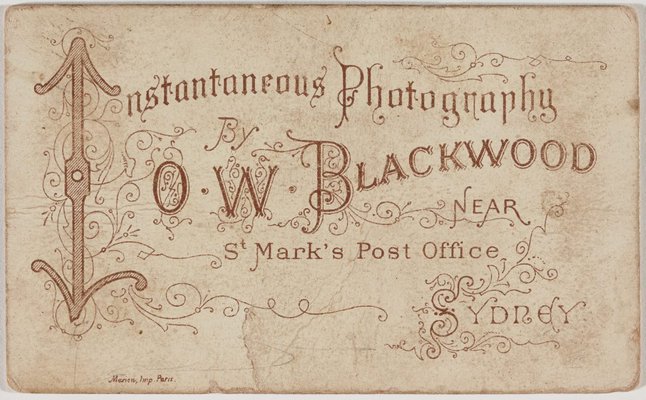-
Details
- Date
- 1859-1864
- Media category
- Photograph
- Materials used
- carte de visite
- Dimensions
- 5.6 x 9.4 cm image; 6.3 x 10.3 cm mount card
- Signature & date
Not signed. Not dated.
- Credit
- Purchased 2014
- Location
- Not on display
- Accession number
- 261.2014
- Copyright
- Artist information
-
William Blackwood
Works in the collection
- Share
-
-
About
Olaf William Blackwood (known as William) was a successful professional photographer of views and panoramas in Sydney. By 1858 Blackwood had established a photographic studio in East Sydney and commenced photographing streets and buildings in the city using the collodion wet-plate process. These views included the intersection of Bridge and George Streets, the site of the first photograph taken in Australia in 1841. The views were not only the largest photographs thus taken, but acknowledged to be ‘faultless’ and ‘super-excellent’ by the 'Sydney Morning Herald'. In the same year took Blackwood took a series of photographs of Sydney and its harbour from the roof of Government House, which was combined into a panorama. While not the first panorama of Sydney, it was judged by the press to be superior to that taken by the Freeman Brothers two months earlier. Blackwood followed the panorama with an album of views of Sydney’s nine banks and photographed the University of Sydney in 1859 at the request of architect Edmund Blacket. Blackwood also introduced the carte de visite to Sydney in 1859, a photographic format that soon became ubiquitous within the colony as elsewhere.
A carte de visite is a stiff card of about 10 x 6.4 cm, with an attached paper photograph, invented in 1854 by André-Adolphe-Eugène Disderi. They were introduced into Australia in 1859 by William Blackwood with albums arriving in 1860, aiding the collection and distribution of multiple cartes. Cartes were usually portraits and were made by the millions worldwide. Multi-lens, or ‘multiplying’ cameras were introduced in the 1860s, which were capable of producing from 2 to 32 images in quick succession, dramatically increasing the number of cartes de visite that could be made from a single photographic plate. They were easily reproduced by making paper contact prints from the glass plates, which were then cut and pasted to card.
-
Exhibition history
Shown in 1 exhibition
The photograph and Australia, Art Gallery of New South Wales, Sydney, 21 Mar 2015–08 Jun 2015
The photograph and Australia, Queensland Art Gallery, South Brisbane, 04 Jul 2015–11 Oct 2015

